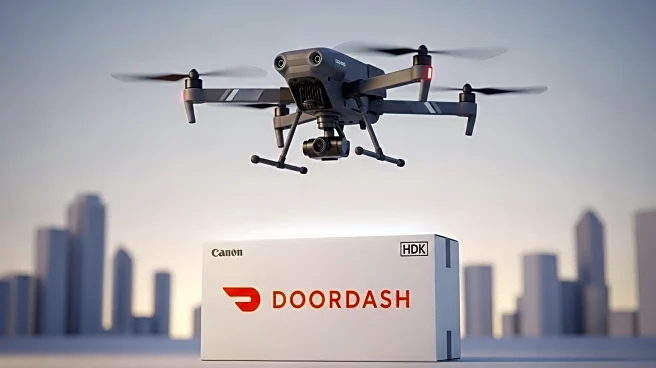What is the story about?
What's Happening?
DoorDash has introduced its DashMart Fulfillment Services, expanding its logistics capabilities to include inventory management, picking, packing, and delivery. This service leverages DoorDash's network of over 100 DashMart locations, which store a variety of goods for quick delivery. The initiative aims to enhance delivery speed and accuracy for retail partners. Notable early adopters include CVS Pharmacy and Party City, with the latter utilizing the service to continue operations following its 2024 bankruptcy. DoorDash CEO Tony Xu emphasized the service's potential to support local economies by connecting businesses with consumers efficiently.
Why It's Important?
The launch of DashMart Fulfillment Services marks a significant expansion for DoorDash beyond its traditional food delivery model, positioning it as a key player in the broader retail logistics sector. This move could provide a competitive edge in the instant delivery market, challenging established players like Amazon. Retailers benefit from DoorDash's infrastructure without needing to invest in their own logistics systems, potentially increasing their market reach and customer satisfaction. The service's 24/7 availability further enhances its appeal, offering retailers the ability to meet consumer demands at any time.
What's Next?
As DoorDash continues to roll out its fulfillment services, more retailers are expected to join, potentially increasing the company's market share in the logistics sector. The success of this initiative could prompt further expansion and innovation in DoorDash's service offerings. Additionally, competitors like Uber Eats and Grubhub may respond with similar enhancements to their logistics capabilities to maintain market relevance.
Beyond the Headlines
The introduction of DashMart Fulfillment Services could have long-term implications for the retail industry, particularly in how businesses approach logistics and customer service. By outsourcing these functions to DoorDash, retailers can focus on core business activities, potentially leading to more streamlined operations and cost savings. This shift may also influence consumer expectations, with faster and more reliable delivery becoming the norm.
















